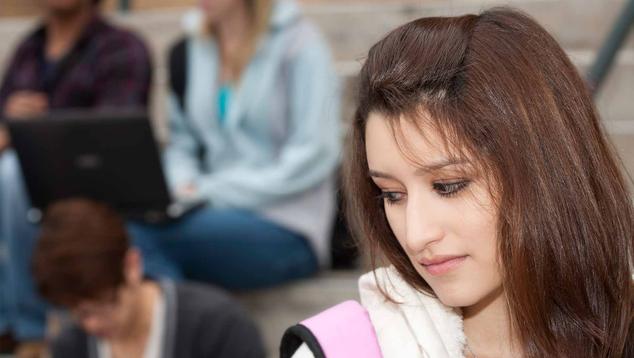This is the second of two articles exploring the challenges facing Hispanic learners in the U.S. who are enrolled in education and training programs after high school, based on results from the Lumina Foundation-Gallup State of Higher Education 2022 study.
As Hispanic students struggled more than any other race or ethnicity to stay enrolled in post-high school education and training programs in 2022, a recent Lumina Foundation-Gallup study shows they were also more likely to feel discriminated against, harassed, disrespected, and physically and psychologically unsafe at their institutions.
About one in four Hispanic students currently enrolled in a post-high school education or training program said they “frequently” or “occasionally” experience each of these negative feelings -- a higher rate than for students of any other race or ethnicity. These higher rates are driven largely by the negative experiences Hispanic students have in short-term credential programs rather than associate or bachelor’s degree programs.
These findings, from the Lumina Foundation-Gallup State of Higher Education 2022 study, conducted Oct. 26-Nov. 17, 2022, highlight the challenges facing a Hispanic college student population that had been growing exponentially for decades -- until the pandemic arrived.
Although Hispanic students were more likely than students of any other race or ethnicity to have these experiences at least occasionally, they were not alone. About one in five Black post-high school students reported experiencing discrimination this often.
Roughly Four in 10 Report Negative Experiences at Short-Term Credential Programs
As Gallup observed in the data among Black students, rates of negative experiences are substantially higher among Hispanic students pursuing short-term credentials -- including certificates and professional certifications. Roughly four in 10 Hispanic students in these programs said they have these experiences, which is about two to three times higher than rates for students in associate or bachelor’s degree programs.
The higher rates of negative experiences among Black and Hispanic students enrolled in short-term programs are particularly concerning, given the increasing popularity of these programs in the U.S., particularly among students of color. Certificates made up just over one in seven of the postsecondary credentials that White students completed between 2020 and 2021 at Title IV degree-granting institutions, compared with one in five Black and Hispanic students.
These higher rates of negative experiences are also relatively unique to students pursuing short-term credential programs. Hispanic students enrolled in associate or bachelor’s degree programs were as likely as Black or White students to report being discriminated against and other negative experiences.
Hispanic Students With Negative Experiences Twice as Likely to Consider Stopping Out
Hispanic students in 2022 continued to be the most likely of any major racial or ethnic group to report considering “stopping out” or pausing their studies for one term or longer. More than half of Hispanic students (52%) said that in the past six months, they had considered stopping their coursework for at least one term.
The chief reasons Hispanic students gave for why they considered stopping out were generally similar to those for students from other racial and ethnic backgrounds: emotional stress, personal mental health reasons, cost, inflation and difficult coursework. However, Hispanic students were more likely to consider stopping out because of caregiving responsibilities.
While the survey did not offer “discrimination” as a reason for stopping out, Hispanic students who felt discriminated against or had any of the other negative experiences were much more likely to consider leaving their studies than those who did not. Hispanic students who reported having these negative experiences at least occasionally were about twice as likely as those who reported few or no experiences to say they considered stopping their coursework in the past six months.
Not All Bad Experiences
While Hispanic students were more likely than Black and White students to report having negative experiences in short-term credential programs, they were about as likely as these other two groups of students to say they have positive experiences at their institutions. Hispanic students were as likely to strongly agree that they have a mentor, have professors and other students who care about them, and feel as if they belong.
They were also just as likely as other students to say their school is a welcoming place, students are comfortable sharing their opinions, there are many opportunities for extracurricular activities and social events, and they have supportive friendships.
Bottom Line
The higher rates of Hispanic students who reported feeling discriminated against, disrespected, harassed, and unsafe -- particularly in short-term credential programs -- are troubling signs for a group of students who were already struggling more to stay in school. While short-term credential programs are growing increasingly popular, the negative experiences suggest these programs may require greater regulatory oversight.





